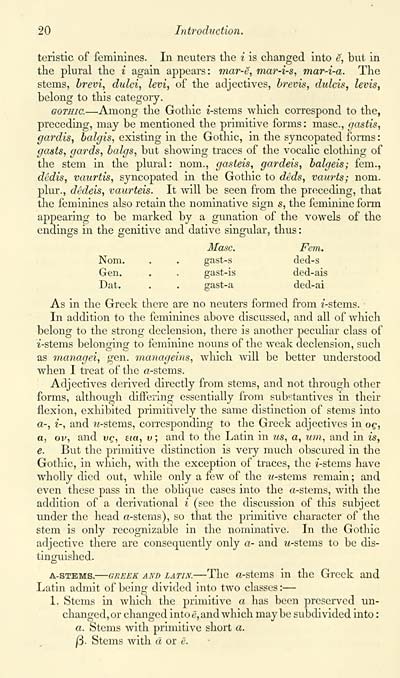Blair Collection > Celtic studies
(50)
Download files
Complete book:
Individual page:
Thumbnail gallery: Grid view | List view

20 Introduction.
teristic of feminines. In neuters the i is changed into e, but in
the plural tlie i again appears: mar-S, mar-is, mar-i-a. The
stems, hrevi, dulci, levi, of the adjectives, hrevis, dulcis, levis,
belong to this category.
GOTHIC. — Among the Gothic i-stems which correspond to the,
preceding, may be mentioned the primitive forms : masc, gastis,
gardis, balgis, existing in the Gothic, in the syncopated forms :
gasts, gards, balgs, but showing traces of the vocalic clothing of
the stem in the plural: nom., gasteis, gardeis, halgeis; fem.,
dedis, vaurtis, syncoj)ated in the Gothic to deds, vaurts; nom.
plur., dedeis, vaurteis. It will be seen from the preceding, that
the feminines also retain the nominative sign s, the feminine form
appearing to be marked by a gunation of the vowels of the
endings in the genitive and dative singular, thus :
Masc. Fem.
Nom. . . gast-s ded-s
Gen. . . gast-is ded-ais
Dat. . . gast-a ded-ai
As in the Greek there are no neuters formed from z'-stems.
In addition to the feminines above discussed, and all of which
belong to the strong declension, there is another peculiar class of
z'-stems belonging to feminine noims of the weak declension, such
as managei, gen. 7nanageins, which Avill be better imderstood
when I treat of the a-stems.
Adjectives derived directly from stems, and not through other
forms, although differing essentially from substantives in their
flexion, exhibited primitively the same distinction of stems into
a-, i-, and ?^-stems, corresj)onding to the Greek adjectives in og,
a, ov, and vg, em, v ; and to the Latin in us, a, um, and in is,
e. But the primitive distinction is very much obscm-ed in the
Gothic, in which, with the exception of traces, the z-stems have
wholly died out, while only a few of the ?<-stems remain ; and
even these pass in the oblique cases into the a-stems, with the
addition of a derivational i (see the discussion of this subject
under the head a-stems), so that the primitive character of the
stem is only recognizable in the nominative. In the Gothic
adjective there are consequently only a- and z<-stems to be dis-
tinguished.
A-STEMS. — GREEK AND LATIN. — Tlic a-stcms in tlic Gi'cck and
Latin admit of being divided into two classes : —
1. Stems in which the primitive a has been preserved un-
changed, or changed into rl, and which maybe subdivided into :
a. Stems with primitive short a.
/3. Stems with d or e.
teristic of feminines. In neuters the i is changed into e, but in
the plural tlie i again appears: mar-S, mar-is, mar-i-a. The
stems, hrevi, dulci, levi, of the adjectives, hrevis, dulcis, levis,
belong to this category.
GOTHIC. — Among the Gothic i-stems which correspond to the,
preceding, may be mentioned the primitive forms : masc, gastis,
gardis, balgis, existing in the Gothic, in the syncopated forms :
gasts, gards, balgs, but showing traces of the vocalic clothing of
the stem in the plural: nom., gasteis, gardeis, halgeis; fem.,
dedis, vaurtis, syncoj)ated in the Gothic to deds, vaurts; nom.
plur., dedeis, vaurteis. It will be seen from the preceding, that
the feminines also retain the nominative sign s, the feminine form
appearing to be marked by a gunation of the vowels of the
endings in the genitive and dative singular, thus :
Masc. Fem.
Nom. . . gast-s ded-s
Gen. . . gast-is ded-ais
Dat. . . gast-a ded-ai
As in the Greek there are no neuters formed from z'-stems.
In addition to the feminines above discussed, and all of which
belong to the strong declension, there is another peculiar class of
z'-stems belonging to feminine noims of the weak declension, such
as managei, gen. 7nanageins, which Avill be better imderstood
when I treat of the a-stems.
Adjectives derived directly from stems, and not through other
forms, although differing essentially from substantives in their
flexion, exhibited primitively the same distinction of stems into
a-, i-, and ?^-stems, corresj)onding to the Greek adjectives in og,
a, ov, and vg, em, v ; and to the Latin in us, a, um, and in is,
e. But the primitive distinction is very much obscm-ed in the
Gothic, in which, with the exception of traces, the z-stems have
wholly died out, while only a few of the ?<-stems remain ; and
even these pass in the oblique cases into the a-stems, with the
addition of a derivational i (see the discussion of this subject
under the head a-stems), so that the primitive character of the
stem is only recognizable in the nominative. In the Gothic
adjective there are consequently only a- and z<-stems to be dis-
tinguished.
A-STEMS. — GREEK AND LATIN. — Tlic a-stcms in tlic Gi'cck and
Latin admit of being divided into two classes : —
1. Stems in which the primitive a has been preserved un-
changed, or changed into rl, and which maybe subdivided into :
a. Stems with primitive short a.
/3. Stems with d or e.
Set display mode to: Large image | Transcription
Images and transcriptions on this page, including medium image downloads, may be used under the Creative Commons Attribution 4.0 International Licence unless otherwise stated. ![]()
| Early Gaelic Book Collections > Blair Collection > Celtic studies > (50) |
|---|
| Permanent URL | https://digital.nls.uk/75771732 |
|---|
| Description | A selection of books from a collection of more than 500 titles, mostly on religious and literary topics. Also includes some material dealing with other Celtic languages and societies. Collection created towards the end of the 19th century by Lady Evelyn Stewart Murray. |
|---|
| Description | Selected items from five 'Special and Named Printed Collections'. Includes books in Gaelic and other Celtic languages, works about the Gaels, their languages, literature, culture and history. |
|---|

